Newly-released cabinet minutes show 1988 was a game-changer as Mike Ahern and the Fitzgerald Inquiry cleaned up after Bjelke-Petersen years
1988 was a critical bridge between the ruins of the government led by the National Party’s Joh Bjelke-Petersen and the promise of a fresh start under the ALP’s Wayne Goss.

QLD News
Don't miss out on the headlines from QLD News. Followed categories will be added to My News.
ON A recent Thursday morning at the Queensland State Archives in Runcorn, 19km south of Brisbane’s CBD, a clutch of dignitaries gathered for a historic moment – the annual lifting of the 30-year embargo on Cabinet Minutes.
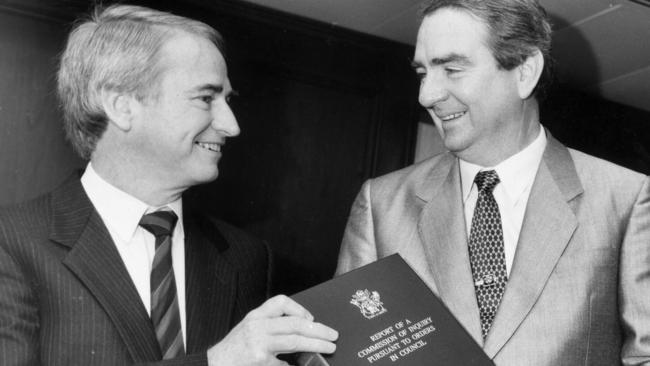
The year 1988 was a critical bridge between the ruins of the government led by the National Party’s Joh Bjelke-Petersen until the end of 1987, and the promise of a fresh start under the ALP’s Wayne Goss in December 1989.
In charge from December 1, 1987 until September 25, 1989, was Michael John Ahern, who had entered parliament in 1968, and had inherited a broken government ruptured by ongoing revelations from the Fitzgerald Inquiry into police and political corruption.
The 1988 Cabinet Minutes were generated under Ahern’s premiership, and here he was dominating the space in both height and personality.
Ahern yarned with the Minister for Housing and Public Works, Digital Technology and Sport, Mick de Brenni, and Dr Anthony Marinac, who prepared the 2524 Cabinet Minutes for public release.
And still, after all these years, Ahern radiated the quiet, measured dignity and sense of decency that he had maintained in his political career, and that would prove pivotal to that bridging period.
Occasionally resting on his leather-wrapped walking cane, Ahern, 76, surveyed the room.
Just after 10.30am Mr de Brenni began speaking.
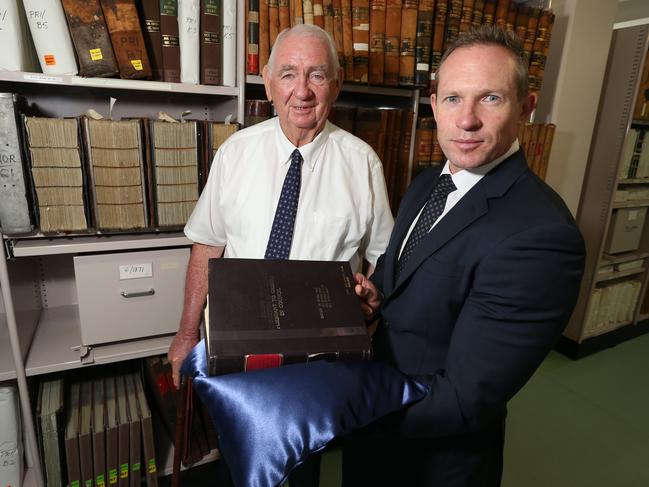
“Ahern took over in difficult circumstances, became leader of a government that had lost a lot of trust … shackled by a Cabinet of conservatives. Ahern brought principles Queenslanders had been waiting for a long time,” he said.
“The Ahern Government took a significant number of decisions in 1988 … decisions, in fact, implementing transparency models in order to rebuild trust with Queenslanders.
“Thirty years on and trust is now a bedrock of modern day Queensland politics under today’s Premier.”
De Brenni was right. The 1988 minutes show a Premier working hard to usher Queensland into the modern world after a generation of cronyism, corruption and lack of respect for due process.
Ahern also had an eye on the unfolding Fitzgerald Inquiry and to future reform necessary to help expunge decades of corruption.
If Queensland needed a new broom, Ahern was it, and he wasn’t going to wait around for Fitzgerald’s final report, which ultimately wasn’t released until mid-1989.
The papers also reflected critical decisions around disgraced former Commissioner of Police, Sir Terence Lewis.
Ahern took the Police Complaints Tribunal out of the Police Department and slotted it under the umbrella of Justice. No longer would Queensland police investigate alleged wrongdoings of their own.
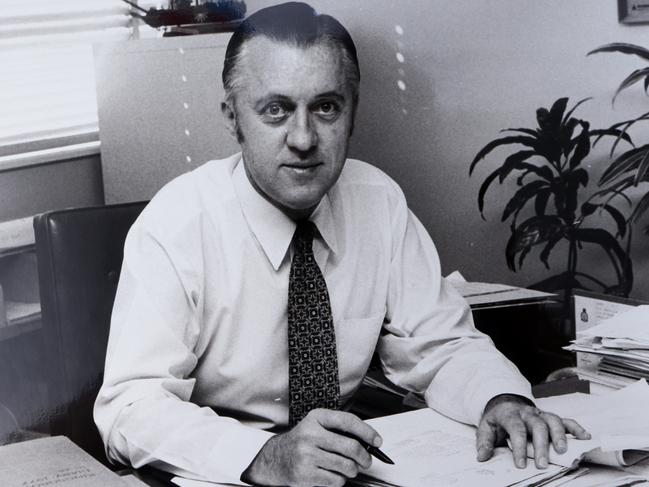
Dr Marinac, in an essay written for the occasion titled Michael John Ahern: A Frustrated Reformer, pointed out the fraught position Ahern found himself in when he was elevated to premier after Bjelke-Petersen was dumped.
“He led a government which was pummeled by revelations of corruption,” Dr Marinac wrote. “He was stepping into shoes vacated by a populist … and within weeks he went from facing the fairly unimpressive Nev Warburton as Opposition leader, to facing the young, media-attractive, articulate Wayne Goss.
“He (Ahern) had two years before an election was due, and only two possible strategies: to portray himself as son-of-Joh, embodying the same political approach but more distant from the taint of corruption; or to cut an entirely new path, and to engage in the sort of reform that (it was clear) would follow from the Fitzgerald Report and the election of a Labor Government. It is already clear … that Ahern chose the latter path.”
Ahern rose to the lectern.
He joked about Mr de Brenni’s reminder that Ahern, as premier, had once been booed by the crowd at a rugby league match at Lang Park.
“I hold my own opinion about the decision by the crowd at Lang Park to boo me,” he said. “I’m advised that that’s a very important thing to happen to you in your life. You know you’ve made it.”
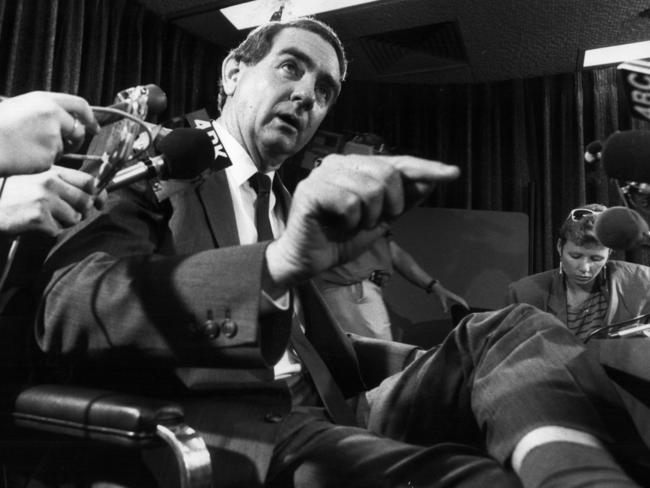
He spoke of the importance of reform in his short period of leadership, validated time and again by the 1988 Cabinet Minutes.
“This was part of what was mine to do,” Ahern said. “To do these things at that time. These things had to be done as soon as possible. It was a starting place for a genuine reform process.”
In his opinion, he said, the most important Cabinet decision made in that critical year was to allow for expansion of the terms of reference of the Fitzgerald Inquiry.
This was Cabinet Minute #54969, dated August 25, 1988. The original terms of reference dealt specifically with police corruption. Fitzgerald wanted to widen his net.
“This started out as a police inquiry,” Ahern said. “But we found a number of key players saying the inquiry had nothing to do with them, because they weren’t police officers.
“There was no written submission. I took it to Cabinet and said we could either do it and get it done or wait for a few months and be scrutinised by the media and have to do it anyway. We got it done and moved forward. It was probably the most important decision I put to Cabinet all those years ago.”
As a result of that decision, Fitzgerald’s inquiry was able to drill down into institutional corruption in government, the police, and the community.
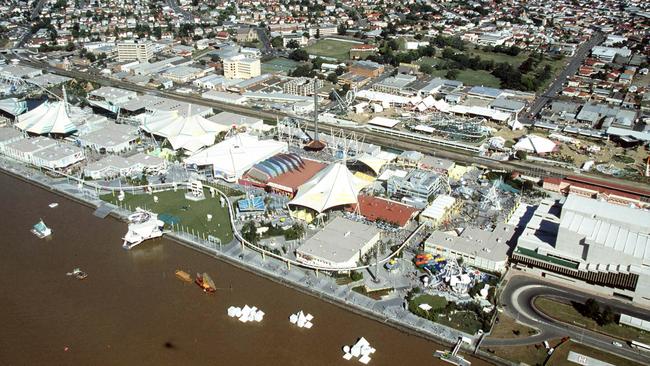
It enabled Tony Fitzgerald to do his job properly, even at the expense of the reputation of the government. Some of its own ministers would be found guilty of corruption and jailed.
“It was a year of necessary change,” Ahern said. “How do you rebuild trust? Not through rhetoric. Through deeds and actions.”
After the speeches, Ahern joined guests at a table of small sandwiches.
On the wall behind the table was projected a rolling slide show of images – some of them Cabinet Minutes, others photos from World Expo 88, the seminal event, along with the Fitzgerald Inquiry, of that extraordinary year.
And the names of politicians of the day – Gunn, Gibbs, Glasson, Austin, Lester Tenni, Harper, Muntz and on.
We were back in the year of Neighbours and Kylie Minogue, of Pat Cash at Wimbledon, and of Prime Minister Bob Hawke. And Premier Mike Ahern.
“In life you get given things to do, and you go out and do it,” he said quietly. “It was something that was mine to do.”


